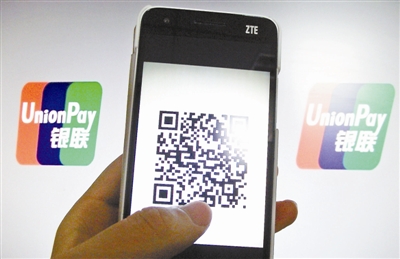


China UnionPay, a major bank card association in China, has issued standards for QR payment, aiming to unify technical requirements and reduce payment risks caused by technical deficiencies of small and medium payment institutions. According to experts, the move will likely cause a stir in the nation’s mobile payment market, which has long been occupied by two Internet giants: Alibaba and Tencent.
At present, the payment market offers a tripartite-party model and a quarter-party model. Associations like UnionPay, Visa and MasterCard all use the latter model, while Alibaba’s Alipay, Tencent’s WeChat Wallet and other third-party payment institutions utilize the tripartite-party model, which connects to banks directly, bypassing bank card associations.
“Compared to Alipay and WeChat, UnionPay's QR will be safer,” said Dong Ximiao, a researcher from the Chongyang Institute for Financial Studies under Renmin University. “It allows payment via the swiping of a card, avoiding the financial risks of using a fiscal account.”
As of June 2016, online payment users reached 455 million in China, of which mobile payment users surged to 424 million. Nearly 65 percent of Internet users utilize mobile payment tools. UnionPay cannot allow the fast-growing market to slip away.
“With the entry of UnionPay, the duopoly pattern will be ended, and the market share of banking systems will be expanded,” Dong said in an interview with Beijing Business.
 Fire brigade in Shanghai holds group wedding
Fire brigade in Shanghai holds group wedding Tourists enjoy ice sculptures in Datan Town, north China
Tourists enjoy ice sculptures in Datan Town, north China Sunset scenery of Dayan Pagoda in Xi'an
Sunset scenery of Dayan Pagoda in Xi'an Tourists have fun at scenic spot in Nanlong Town, NW China
Tourists have fun at scenic spot in Nanlong Town, NW China Harbin attracts tourists by making best use of ice in winter
Harbin attracts tourists by making best use of ice in winter In pics: FIS Alpine Ski Women's World Cup Slalom
In pics: FIS Alpine Ski Women's World Cup Slalom Black-necked cranes rest at reservoir in Lhunzhub County, Lhasa
Black-necked cranes rest at reservoir in Lhunzhub County, Lhasa China's FAST telescope will be available to foreign scientists in April
China's FAST telescope will be available to foreign scientists in April "She power" plays indispensable role in poverty alleviation
"She power" plays indispensable role in poverty alleviation Top 10 world news events of People's Daily in 2020
Top 10 world news events of People's Daily in 2020 Top 10 China news events of People's Daily in 2020
Top 10 China news events of People's Daily in 2020 Top 10 media buzzwords of 2020
Top 10 media buzzwords of 2020 Year-ender:10 major tourism stories of 2020
Year-ender:10 major tourism stories of 2020 No interference in Venezuelan issues
No interference in Venezuelan issues
 Biz prepares for trade spat
Biz prepares for trade spat
 Broadcasting Continent
Broadcasting Continent Australia wins Chinese CEOs as US loses
Australia wins Chinese CEOs as US loses